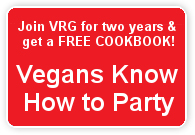
Iodine in the Vegan Diet
By Reed Mangels, PhD, RD
From Simply Vegan 5th Edition, updated
Summary: Iodine sources for vegans include iodized salt, iodine supplements, and some sea vegetables. Some sea vegetables can provide too much iodine if used frequently.
Iodine is needed for the thyroid gland to function properly. An iodine deficiency can lead to goiter (enlarged thyroid gland), hypothyroidism, and to impaired mental and physical development in infants and children. In the United States, a major source of iodine is iodized salt. Iodine is also found in seafoods (fish and sea vegetables) and in dairy products. The amount of iodine in plant foods depends on the iodine content of the soil. Commercial plant milks are very low in iodine unless they are fortified with iodine (1). Salt added to processed foods usually does not contain iodine. Vegan diets may be low in iodine if they do not include iodized salt or sea vegetables. Studies have reported that iodine intakes of vegans in several countries, including the United States, are lower than those of non-vegetarians (2-4). Low iodine intakes, in conjunction with high intakes of soy products and raw Brussels sprouts, broccoli, cauliflower, and cabbage can result in thyroid problems. Thus, it is prudent for vegans to have regular, reliable sources of iodine.
One simple way to meet iodine needs is by using iodized salt in cooking and at the table. In the U.S., about a half teaspoon of iodized salt provides the recommended amount of iodine (150 micrograms daily for most adults (5,6)). Some brands of sea salt are also iodized — check the label for this information and for the amount of iodine that has been added. For those who prefer to avoid salt, iodine supplements can be used as a source of iodine. The American Thyroid Association recommends that pregnant women living in the United States and Canada take a prenatal vitamin containing 150 micrograms of iodine daily (7). Avoid use of supplements providing more than the Upper Limit for iodine of 1100 micrograms per day.
Sea vegetables such as kombu or hiziki can serve as alternative iodine sources, but it is easy to get too much iodine from some sea vegetables. Although the iodine coontent of sea vegetables is quite variable, one study suggests that as little as 0.6 teaspoon of hiziki or 3-1/3 nori sheets can meet an adult's daily iodine needs (8). Since too much iodine can also cause health problems, high-iodine sea vegetables should be limited.
Table 10: Iodine Content of Some Sea Vegetables
| Sea vegetable | Iodine (micrograms) in a serving | Amount needed to supply 150 micrograms of Iodine (Adult RDA) | Avoid frequent use of more than this amount per day* |
| Arame | 732/Tablespoon | 0.6 teaspoon | 1.5 Tablespoons |
| Hiziki | 786/Tablespoon | 0.6 teaspoon | 1.4 Tablespoons |
| Kombu | 1454/1" piece | 1/10" | 3/4" piece |
| Nori | 40/sheet | 3-3/4 sheets | 27-1/2 sheets |
| Wakame | 82/Tablespoon | 1.8 Tablespoons | 0.8 cups |
Data from reference 8. All measures are dried (uncooked) sea vegetables. These amounts will vary greatly depending on where the seaweed was gathered and how it was processed and stored.
*Based on Upper Limit of 1100 micrograms of iodine per day. These amounts assume that your diet does not contain other sources of iodine.
References
1. Ma W, He X, Braverman L. Iodine content in milk alternatives. Thyroid. 2016;26(9):1308-10.
2. Leung AM, LaMar A, He X, et al. Iodine status and thyroid function of Boston-area vegetarians and vegans. J Clin Endocrin Metab 2011; 96:E1303-7.
3. Waldmann A, Koschizke JW, Leitzmann C, Hahn A. Dietary intakes and lifestyle factors of a vegan population in Germany: results from the German Vegan Study. Eur J Clin Nutr 2003;57:947-55.
4. Lightowler HJ, Davies GJ. Iodine intake and iodine deficiency in vegans as assessed by the duplicate-portion technique and urinary iodine excretion. Br J Nutr 1998;80:529-35.
5. Institute of Medicine, Food and Nutrition Board. Dietary Reference Intakes for Vitamin A, Vitamin K, Arsenic, Boron, Chromium, Copper, Iodine, Iron, Manganese, Molybdenum, Nickel, Silicon, Vanadium, and Zinc. Washington, DC: National Academy Press, 2001.
6. Dasgupta PK, Liu Y, Dyke JV. Iodine nutrition: iodine content of iodized salt in the United States. Environ Sci Technol. 2008;42:1315-23.
7. Alexander EK, Pearce EN, Brent GA, et al. 2017 Guidelines of the American Thyroid Association for the Diagnosis and Management of Thyroid Disease During Pregnancy and the Postpartum. Thyroid. 2017;27:315-89.
8. Teas J, Pino S, Critchley A, Braverman LE. Variability of iodine content in common commercially available edible seaweeds. Thyroid. 2004;14(10):836-841.


